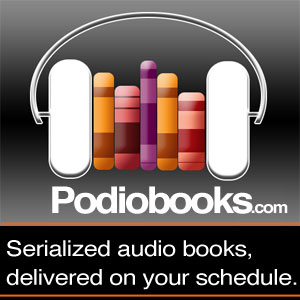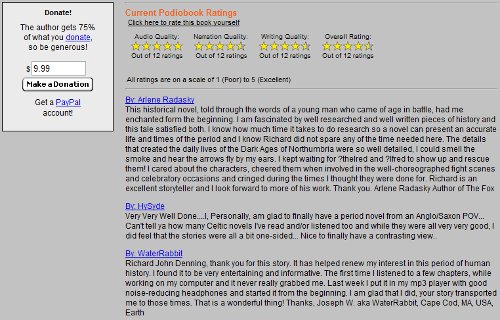An author needs to be open to any opportunities to market their book. Anything which gets the book “out there” and raises its profile is worth considering.
One option I explored was making audio books. The idea here is to release the book as a serialised story. Hopefully if listeners enjoy the book you will get feedback and possibly this can lead to reviews, sales etc.
PodioBooks
There are a number of options whereby an author can go about doing this. One is Podio Books. This site is a FREE to use and free to download site. In theory listeners CAN donate money to authors and in this case the author of the audio book will earn 75% of any donations. In practice donations are (according to the folk who run the site) infrequent but do occasionally happen.
Podiobooks are also supplying some audiobooks to iTunes and a few other sites so there is potential for income. BUT it is best to see this as marketing and not worry about income.
What you do
If you are serious about this possibility you need to do some research. Join Podiobooks and download some books and see how they sound and are put together. Get on the forums and learn a bit about the process. In particular read and re-read the instructions and how to guides. You then produce a sample file which has to go through a mentoring stage before you are cleared to make your audio book.
Equipment
It is best not to record using a Skype headset or similar USB microphone. The help forums will give advice on kit to buy but a good microphone from Maplins or a similar electronic store is a starting point. Serious Podio Books users, just like regular podcasters have mini studio setup that look like a radio studio:
Such a set up, with mixer, headphones, microphone, etc etc will cost £100s but on Podio Books there are suggestions for starting kits of less that $200 say. The key seems to be a good microphone and a good headset.
Software
There are free software packages that you can use to record to and edit your audio book
Audacity
Audacity is a free to download programme that is easy to use. It offers noise reduction. Editing is simple
http://www.download-audacity.com/ is where you grab it. You can set it to take sound from various input routes. You can cut and paste sections, delete errors etc.
The Levelator
The Levelator automatically evens out the sound levels of an audio recording. When you are recording your voice will go up and down in volume. Levelator evens all that out as well as boosting the volume of spoken word.
http://www.singularsoftware.com/levelator.html
Mixcraft
Mixcraft is a paid for programme that allows for blending and mixing various sounds tracks into a recording as well as adding sound effects and making sections of the recording have the sound qualities of certain situations. For eg you could make a part echoey like in a cathedral.
Magnatunes
With the curious tagline of “we are not evil” (at one point Magnatunes got flack along the lines of Napster but pays musicians for their work) Magnatunes is a bit like iTunes – a huge database of music. You can download a lot for free and there are various arrangements if you wish to use tracks on podcasts and audiobooks. With a large array of styles the Audio Book producer can find cheap affordable music to use on their recordings. I used a simple section of music as the “intro” and “outro” to each episode.
Its a Wrap
So with all this hardware and software you record an episode, edit it and mix in some music. You export it as an MP3 file (all the techie details are in the guides). You TAG the file with relevant details and then upload it to Podiobooks. Then you get started on the next.
There is a lot to learn about this process and it DOES take a lot of time to record, edit, tag and upload each episode BUT once you have uploaded it there is the pleasing result of seeing new subscriptions coming online. I put the book up about 18 months ago and 306 folk have subscribed to it in that time.
You can see that I am still getting new subscriptions and ratings:
Having done this I realise that I could do more to make the sound better, pace my reading more, use more emotion, reducing breath sounds, cracks and pops etc- so I think I would do better the next time. I am in fact starting to think about doing another book.
You can take a look at my book page and listen to a bit:
The Amber Treasure
Historical Fiction in Dark Ages Britain
…all good stories are about a sword.
The Amber Treasure is historical fiction set in Dark Age Britain –
598 A.D. Betrayal threatens the Kingdom of Northumbria.








Related Articles
3 users responded in this post
Good overview, Richard.
I think the advice to listen to a few first is spot on. Too many people get into recording and production before they know where they’re going.
The only advice I’d change is that I’d recommend a good pair of headphones and a decent digital recorder. Using something like the Zoom H1 gives a clean source and has the advantage of having very good mic’s built in. Going with the recorder means no computer noise in the background and gives the cleanest possible source.
This *is* a great way to build a platform and to find out if there’s an audience for your work. The best way to build that audience is to keep pumping out work. Nothing builds fans like fresh content.
Yes headphones are a must. In the end I had a good mic, good headphones and decent sound card in a old but trusty PC in an upstairs (quiet) room. I actually stretched an old stocking over a wire clothes hanger in later episodes to reduce pops and breath sounds.
Belinda I don’t know how to get listed – I imagine like all news sites if you have content of relevance they might cover it